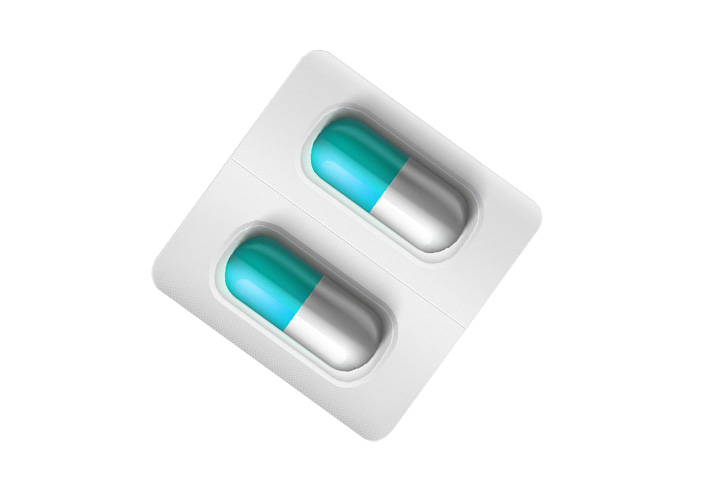Doxycycline
Doxycycline contains a tetracycline antibiotic that acts against pathogens, bacteria that cause infections.
Medicine is used in the treatment of infections such as:
- respiratory tract infections
- ear, nose and throat infections
- urinary tract infections
- genital tract infections
- skin and soft tissue infections
- gastrointestinal infections
- obstetric and gynaecological infections
- mouth infections
- eye infections
- certain tick-borne infections.
This antibiotic is indicated for the prevention of the following infections:
- travellers' diarrhoea
- malaria in certain regions of the world.
What Does Doxycycline Contain?

1 Doxycycline 100 mg scored tablet contains the active substance 100 mg doxycycline monohydrate.
1 Doxycycline 200 mg scored tablet contains as active ingredient 200 mg as doxycycline monohydrate.
Excipients
Carboxymethyl starch sodium (type A), microcrystalline cellulose, crospovidone, calcium arachinate.
Forms and Strengths
Doxycycline 100 mg tablets (scored): boxes of 10 or 20 tablets.
Doxycycline 200 mg tablets (scored): boxes of 10 tablets.
Uses
Doxycycline tablets should be swallowed with sufficient liquid, in a sitting or standing position, at least one hour before meals and at least one hour before bedtime.
Tablets may be taken as they are or dissolved in approximately 50 ml of water. If taken as they are, you should then drink sufficient liquid (1 glass). If taken after dissolution, you should then drink at least 100 ml of water.
If severe stomach upsets occur when Doxycycline is taken as prescribed, it is advisable to take the tablets with food or a glass of milk.
The dosage and duration of treatment prescribed by the doctor must be strictly adhered to in order to obtain the optimum effect of Doxycyclin. The symptoms of the disease often disappear before the infection is completely cured. Therefore, do not stop treatment prematurely, even if you feel better.
Unless otherwise prescribed by your doctor, the usual dosage of Doxycycline is as follows:
Adults and adolescents weighing more than 50 kg: on the first day, 200 mg (2 tablets of 100 mg or 1 tablet of 200 mg) in a single dose, as it is with sufficient liquid, or dissolved in approximately 50 ml of water. On subsequent days, 100 mg (1 tablet) per day. For special indications, the daily dose may be increased as prescribed by your doctor.
Side Effects
Taking Doxycycline may cause the following side effects:
Common (affects 1 to 10 people in 100)
Sensitivity to light. Severe sunburn may occur after exposure to the sun or ultraviolet light, accompanied in rare cases by nail damage (separation and discolouration of the nails). Nausea, vomiting, headache, rash, hypersensitivity reactions (including anaphylactic shock, swelling, rash, hypotension, breathing difficulties and increased heart rate), inflammation of the pericardium, swelling of the skin or mucous membranes (such as swelling of the eyelids, lips or tongue), worsening of symptoms of butterfly erythema (an autoimmune disease called systemic lupus erythematosus), delayed hypersensitivity reaction, swelling of the arms or legs.
If the first signs of a skin reaction appear, you should stop taking the medicine and inform your doctor immediately.
Occasional (affects 1 to 10 people in 1,000)
Digestive disorders, inflammation of the mucous membranes of the mouth and throat, hoarseness, black tongue, itching, coagulation disorders, blood in the urine.
Rare (affects 1 to 10 people in 10,000)
Inflammation of the pancreas (pancreatitis) is marked by sudden severe pain in the upper abdomen, accompanied by nausea and vomiting. Other side effects include diarrhea, tongue inflammation, permanent teeth discoloration, difficulty swallowing, decreased appetite, and increased pressure inside the skull, which may cause headaches, dizziness, fatigue, and blurred or double vision. Patients may also experience heart palpitations, restlessness, anxiety, sensory disturbances like tingling, and bulging fontanelles, particularly in small children. Additional symptoms can include facial flushing, severe inflammatory skin reactions, and the Jarisch-Herxheimer reaction, characterized by high fever, headaches, joint and muscle pain, nausea, and a skin rash. Other issues may involve abdominal pain, inflammatory lesions in the ano-genital region, esophagitis, disturbances or loss of taste and smell (which may be partially or fully reversible), changes in blood work, liver function abnormalities, hepatitis, liver toxicity, ringing in the ears, increased skin pigmentation, joint and muscle pain, and kidney damage.
Very rare (affects less than one person in 10,000)
Convulsive seizures.
Mild signs of intolerance such as loss of appetite, difficulty swallowing, nausea, vomiting or diarrhoea can usually be avoided by taking Doxycycline with a glass of milk, yoghurt or after a light meal.
Tell your doctor immediately:
- if signs of a hypersensitivity reaction such as itching, skin rash, swelling of the face, sensation of increased pulse, respiratory distress or swollen limbs appear;
- in the event of yellowish discolouration of the skin or the white part of the eyes;
- in the event of sudden onset of stomach pains or vomiting, severe bloody or persistent diarrhoea;
- if vision problems occur;
- If you notice any side effects, please tell your doctor or pharmacist. This applies in particular to side effects not mentioned in this package leaflet.
Precautions
The administration of tetracyclines to pregnant women in the second half of pregnancy, to young children and to children under the age of 12, may lead to permanent yellow-grey-brown discolouration of the teeth or imperfect formation of the dental enamel.
For this reason, these patients should only take Doxycycline if specifically prescribed by a doctor.
If you suffer from liver disease, you should only take this drug if your doctor has expressly prescribed it and if you remain under strict medical supervision.
If you develop a skin reaction (such as a rash or itching), you must stop taking the medicine and tell your doctor immediately.
Avoid direct exposure to sunlight or ultraviolet light, as Doxycycline may cause hypersensitivity reactions to light. If reddening of the skin occurs as a result of direct exposure to the sun or ultraviolet light, you should discontinue treatment and consult your doctor immediately.
To limit the risk of oesophageal irritation or ulceration, tablets should be dissolved in approximately 50 ml of water and swallowed with sufficient liquid.
Slight digestive problems may occur when taking Doxycycline tablets. In the event of severe gastrointestinal problems with vomiting and diarrhoea, you should stop taking the preparation and inform your doctor immediately. Medicines that inhibit intestinal peristalsis (movement of the intestine) should not be taken if diarrhoea occurs.
Patients taking antacids or bismuth salts for gastric problems, and patients taking iron-containing preparations, should not take these medicines at the same time as Doxycyclin, as they have an adverse effect on the absorption of Doxycycline (i.e. passage into the blood). The same applies to activated charcoal and colestyramine-based medicines. Drug should therefore be taken either 2 hours before or 4 hours after these preparations.
Combinations of antibiotics: another antibiotic may only be taken in addition to Doxycycline if specifically prescribed by your doctor.
Tell your doctor if you are taking an anticoagulant (a medicine to thin the blood), an oral antidiabetic (a medicine to lower blood sugar levels), a medicine to reduce the frequency of epileptic seizures, a sleeping pill or a contraceptive ("contraceptive pill").
If you are taking a contraceptive pill, its effectiveness may be reduced during antibiotic treatment. For this reason, your doctor or pharmacist may recommend other contraceptive measures.
Inform your doctor if you are due to undergo an operation in the near future, as the use of a certain anaesthetic (methoxyflurane) while taking Doxycycline may cause fatal kidney damage.
You should not consume alcohol during treatment with Doxycyclin.
Concomitant use of doxycycline and cyclosporine A may increase the toxic effect of the immunosuppressant (cyclosporine A).
Concomitant use of theophylline and tetracyclines may increase the risk of adverse reactions in the gastrointestinal tract.
The use of tetracyclines, including doxycycline, may cause a benign increase in pressure inside the skull, which is normally reversible. However, cases of permanent blindness have been reported following an increase in pressure inside the skull during treatment with tetracyclines, including doxycycline. Contact your doctor as soon as possible if you notice any visual problems during treatment.
It has been established that isotretinoin, an active ingredient used in the treatment of acne, may also, in rare cases, cause a benign increase in pressure inside the skull; the concomitant use of isotretinoin and doxycycline should therefore be avoided.
The concentration of methotrexate may be increased by the simultaneous administration of methotrexate and doxycycline.
Tell your doctor if you are monitoring your glucosuria yourself.
This medicine may affect reactions, driving ability and the ability to use tools or machines!
What else do you need to consider?
Remember that this medicine has been prescribed for you by your doctor to treat your current condition. It must not be used to treat other conditions or other people.
The antibiotic contained in Doxycycline is not effective against all micro-organisms that cause infectious diseases. Taking the wrong antibiotic or the wrong dose can lead to complications. Never, therefore, use it on your own initiative to treat other illnesses or other people. Nor should you use Doxycycline without a prescription in the event of a subsequent infection.
When should Amoxil not be used?
If you are allergic to the active substance Doxycycline, or to other tetracyclines, you must not take this drug.
Please tell your doctor if you have ever had any side effects after taking antibiotics or if you have not tolerated treatment with Doxycycline well.
Hypersensitivity may manifest itself in particular as respiratory distress (asthma), circulatory problems, swelling of the skin (such as urticaria) and mucous membranes, itching or skin rashes.
Medicament should not be used in cases of serious liver disease.
Pregnancy and Breastfeeding
If you are pregnant or planning to become pregnant, you should not take Doxycycline unless specifically prescribed by your doctor.
You must not breast-feed during treatment with Doxycyclin.



